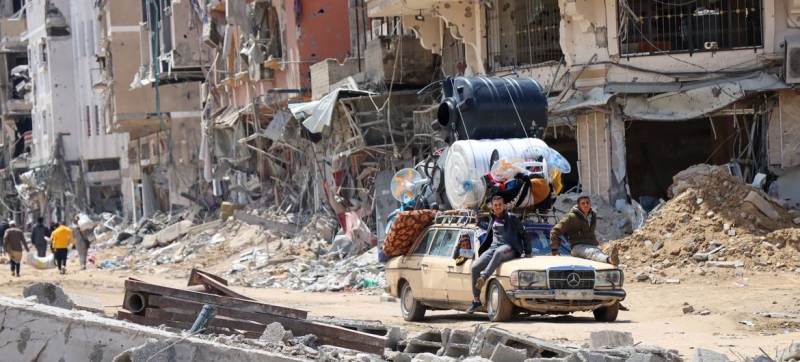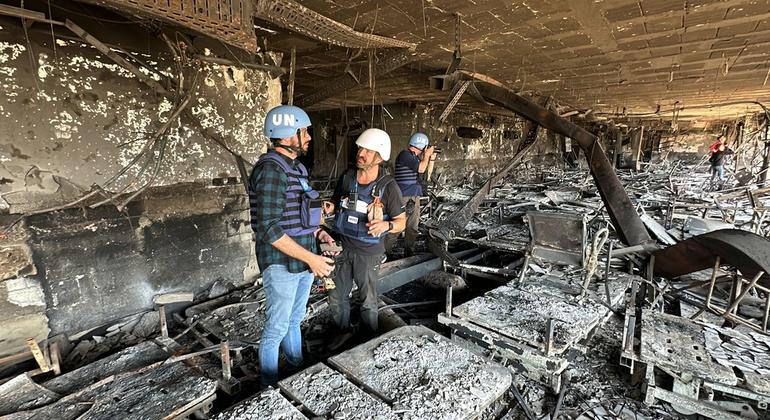
Khan Yunis, southern Gaza. UN experts condemn Israel’s alleged use of AI in Gaza ‘domicide’ and call for reparations Peace and Security
A group of UN special rapporteurs on Monday deplored Israel’s alleged use of artificial intelligence (AI) and related directives in Gaza, which they said had led to unprecedented civilian casualties , loss of housing, vital services and infrastructure.
“Six months into the current military offensive, more housing and civilian infrastructure have been destroyed in Gaza than in any other conflict in history,” experts said. – Homes have disappeared, and with them the memories, hopes and aspirations of Palestinians, as well as their ability to realize their other rights, including the rights to land, food, water, sanitation, health, safety and privacy (especially among women and girls) , education, development, healthy environment and self-determination. And this comes in addition to the systematic demolition of Palestinian homes throughout the decades of occupation and previous bombings.”
According to independent experts, the consistent and widespread destruction of housing, basic services and civilian infrastructure constitutes an act of “domicide” and may amount to war crimes and acts of genocide, as the UN Special Rapporteur on the Occupied Palestinian Territories reported in her recent report to the Human Rights Council. With Israeli officials calling for Palestinians to leave the strip so they can “reclaim” it and build settlements there again, and prominent former US officials expressing enthusiasm for real estate on the Gaza Strip, there is no doubt that Israel’s intentions go far beyond defeat of Hamas, experts say.
According to their statement, if reports of the Israeli military’s use of AI systems such as “Lavender”, “Gospel” and “Where’s Daddy” are confirmed, it will explain the unprecedented scale casualties and destruction.

More than 15,000 deaths—nearly half of all civilian deaths to date—were recorded in the first six weeks after October 7, when the military reportedly relied heavily on artificial intelligence to make choices goals.
Experts are particularly concerned about the alleged use of AI to strike the homes of the families of suspected Hamas militants, usually at night when everyone is asleep, using unguided projectiles and without much attention to where civilians in the area.
UN Special Rapporteurs have also expressed alarm at the practice of bombing targets such as large high-rise residential and public buildings, especially in the early weeks of the war, which appear to have been chosen “with the intention of simply shocking the population and increasing pressure on Hamas.”
Compensation for damage
Between 60 and 70 percent of all residential buildings in Gaza and up to 84 percent of residential buildings in northern Gaza were either completely destroyed or partially damaged. The World Bank, UN and EU estimate that the damage to the sector so far amounts to $18.5 billion, or 97 percent of the total GDP of Gaza and the West Bank. However, 72 percent of this amount is spent on housing, and another 19 percent on civil infrastructure, including water supply, sewerage, electricity and roads.
Experts say the scale of the destruction, which killed more than 33,000 people and forced 1.7 million, or 75 percent, of Gazans from their homes, underscores the importance of reparations to Gaza’s recovery.
“This reparative approach begins with Israel as the occupying power that destroyed Gaza, and with those countries that provided military, material and political support for the war and occupation—all of whom bear both legal and moral responsibility “, the experts said.
Read also:
Six months wars in Gaza: UN plans reconstruction and reconstruction
The statement was signed by: Balakrishnan Rajagopal, Special Rapporteur on the right to adequate housing; Francesca Albanese, Special Rapporteur on the situation of human rights in the Palestinian territory occupied since 1967; Reem Alsalem, Special Rapporteur on violence against women and girls, its causes and consequences; Michael Fakhry, Special Rapporteur on the right to food.
Special Rapporteurs are part of the so-called Special Procedures of the Human Rights Council. Special Procedures experts work on a voluntary basis; they are not UN employees and do not receive a salary for their work. They are independent of any government or organization.
